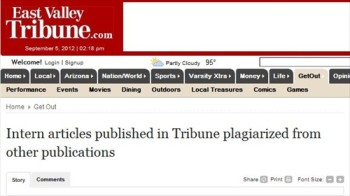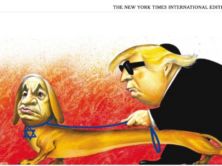
(Credit: East Valley Tribune, screenshot)
The East Valley Tribune announced that it unpublished “several articles” by an unnamed intern who plagiarized. According to the Tribune‘s note on the plagiarism, “the intern, a student at Arizona State University’s Walter Cronkite School of Journalism and Mass Communication, no longer submits articles to the Tribune.”
The Tribune is a local thrice-weekly newspaper in Mesa, Arizona with a circulation of about 98,000, according to Mondo Times.
The Tribune quoted its “news editor and acting managing editor” CeCe Todd as saying that
“Plagiarism is a serious violation of our policies and will not be tolerated at the Tribune. We apologize to our readers and to the writers and publications whose work was plagiarized for this violation of trust and ethics.”
The newspaper added that it “notified” the intern’s school, Arizona State University, about the incident.
We have written to the Tribune’s Todd asking how many articles contained plagiarism, how the newspaper found out about the plagiarism, how many publications were plagiarized, why the newspaper decided not to name the intern, and what editorial layers the student intern’s writing went through and will update with any response. We’ve also written to Arizona State University’s journalism school asking if it is taking any action against the student and will update with any response.
This is yet another in the batch of plagiarism or attribution cases in the past few months. In June, the Poughkeepsie Journal apolgozied for a “thin rewrite” of an article by the Daily Freeman.
NPR announced in July that it unpublished an article by intern Ahmad Shafi that plagiarized from a 2001 book. NPR’s ombudsman Edward Schumacher-Matos called Shafi’s plagiarism the result of a “cultural gap” in ethics and noted that NPR decided “not to punish” Shafi.
In August, Fareed Zakaria apologized and was briefly suspended by Time and CNN for “close similarities” to an article in The New Yorker.
And, the Boston Globe apologized for “some similarities in phrasing and structure to an opinion piece” by the local NPR affiliate WBUR.org.
Most recently, Wired announced it decided to “sever the relationship” with Jonah Lehrer after a review of 18 of his blogposts found examples of plagiarism, fabrication, self-plagiarism, and uncorrected errors. Lehrer had already resigned from the New Yorker over fabricated quotes in his book.





